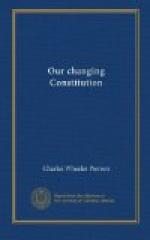Nearly fifty years ago the Supreme Court stated the theory as follows:
The states are, and they must ever be, co-existent with the National Government. Neither may destroy the other. Hence the Federal Constitution must receive a practical construction. Its limitations and its implied prohibitions must not be extended so far as to destroy the necessary powers of the States, or prevent their efficient exercise.[1]
[Footnote 1: Railroad Co. v. Peniston, 18 Wall., 5.]
The court buttresses its decision by the argument ex necessitate—that to hold otherwise would open the way for men to withdraw their business activities from the reach of federal taxation and thus cripple the National Government. The Court says:
The inquiry in this connection is: How far do the implied limitations upon the taxing power of the United States over objects which would otherwise be legitimate subjects of federal taxation, withdraw them from the reach of the Federal Government in raising revenue, because they are pursued under franchises which are the creation of the states?... Let it be supposed that a group of individuals, as partners, were carrying on a business upon which Congress concluded to lay an excise tax. If it be true that the forming of a state corporation would defeat this purpose, by taking the necessary steps required by the state law to create a corporation and carrying on the business under rights granted by a state statute, the federal tax would become invalid and that source of national revenue be destroyed, except as to the business in the hands of individuals or partnerships. It cannot be supposed that it was intended that it should be within the power of individuals acting under state authority thus to impair and limit the exertion of authority which may be essential to national existence.
This argument will not bear scrutiny. It apparently loses sight of the vital distinction between a tax on the mere doing of business and a tax on the privilege of doing that business in a corporate capacity. These are two very different things. The right of Congress to tax the doing of business was not disputed. It had been expressly upheld in the well-known case of Spreckels Sugar Refining Co. v. McClain,[1] which involved a tax on the business of refining sugar, whether done by a corporation or by individuals. The tax under consideration, however, goes further and fastens upon something new—something which in the case of individuals or partnerships has no existence at all—which comes into being only by the exercise of the sovereign power of a state. The opponents of the tax, far from attempting to narrow the existing field of federal taxation, were in fact resisting an encroachment by Congress on an entirely new field, created by, and theretofore reserved exclusively to, the separate states. It was conceded that Congress could tax a business when done by individuals and could tax the same business when done by a corporation. The inquiry was: Does the act of a state in clothing the individuals with corporate capacity create a new subject matter for taxation by the General Government? That was the real question before the Court, and the decision answers it in the affirmative.




